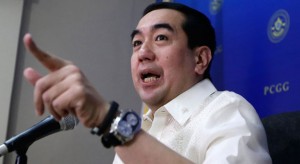What Went Before: Marcos Swiss deposits

Andres Bautista, head of the Philippine Commission on Good Government, which is tasked to recover the alleged ill-gotten wealth of the late strongman Ferdinand Marcos, speaks in a news conference in Mandaluyong City on Wednesday, Feb. 12, 2014. The Philippine government has recovered the remaining $29 million of the multimillion-dollar Swiss bank deposits stashed away by the late dictator Ferdinand Marcos. AP PHOTO/BULLIT MARQUEZ
The Singapore’s Court of Appeal, in its ruling released in January, recognized the right of Philippine National Bank (PNB) to hold in trust the $29 million seized from the estate of the late strongman Ferdinand Marcos. This ends a long saga over the Marcos Swiss deposits, held in the Singapore branch of German bank WestLB.
In July 2003, the Supreme Court ruled that $683 million in Marcos Swiss bank deposits was ill-gotten and ordered it forfeited in favor of the Philippine government. The family of Marcos appealed the decision and the funds remained in escrow with PNB until the high court ruled with finality.
Two months later, however, Hawaii District Court Judge Manuel Real issued a ruling stopping the transfer of the Marcos ill-gotten wealth to the Philippines as ruled by the Supreme Court and threatened banks that did so.
The order is a result of a 1990s ruling by the US court awarding nearly $2 billion in damages against the Marcos estate to victims of the Marcos regime.
In compliance with the US court ruling, WestLB refused to release the funds until a Singapore court makes a ruling on how it should be disposed.
Article continues after this advertisementIn 2004, WestLB went to court to determine the owner of the money after several groups staked claims, including the Philippine government, a group of human rights victims and five foundations believed to be Marcos fronts.
Article continues after this advertisementIn 2006, a Singapore court denied the government’s claim on the Marcos funds. The government appealed the case.
In August 2012, Singapore’s High Court dismissed rival claims and ruled that Marcos deposits in WestLB rightfully belonged to PNB.
In its latest ruling, the Singapore court affirmed the high court’s August 2012 decision. The court explained that it was compelled to reject the rights victims’ claims as the relevant documents did not have the legal effect of transferring any “proprietary interest” in the funds to them.
But the court made clear that the rejection would “not in any way deny the moral claims of the human rights victims and acknowledges that the human rights victims deserve redress for the grievous wrongs that they suffered.”
The court also rejected the claim of the Swiss-based foundations, saying that their entitlement was lost following the Swiss Federal Supreme Court orders effecting the transfers.
Swiss authorities transferred $658 million to PNB in 2002 for safekeeping. PNB then placed the money in various banks in Singapore, including the branch of WestLB, and in Britain.
Andres Bautista, chair of the Presidential Commission on Good Government (PCGG), said the government could use the funds to compensate the rights victims.
He said that when the Swiss government agreed to repatriate the Swiss money, “it was on the condition that the human rights victims are compensated.”
The PCGG, in behalf of the Philippine government, has been battling with the claimants over millions of dollars of Marcos money believed to have been plundered through the years, saying it belonged to the government’s coffers.
“While the original CARP (Comprehensive Agrarian Reform Program) Law stated that part of its funding will be sourced from PCGG recoveries, the subsequent Human Rights Compensation Law also appropriated P10 billion,” said Bautista.
President Aquino signed into law the Human Rights Victim Reparation and Recognition Act of 2013 on Feb. 25 last year, but its implementing rules and regulations cannot be formulated without a claims board.
The President has yet to appoint the chair and eight members of the Human Rights Victims Claims Board.—Inquirer Research
Source: Inquirer archives, The Straits Times